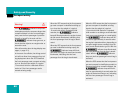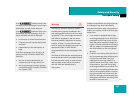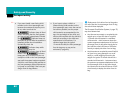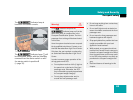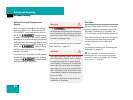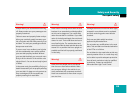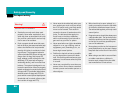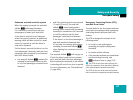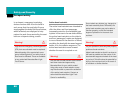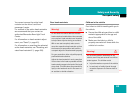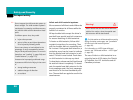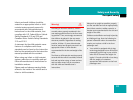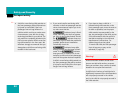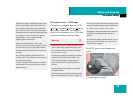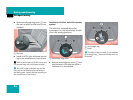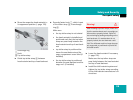
88
Safety and Security
Occupant safety
In an impact, emergency tensioning
devices remove slack from the belts in
such a way that the seat belts fit more
snugly against the body. Belt force limiters,
when activated, are employed to help
reduce the peak force exerted by the seat
belts on occupants during a crash.
Active head restraint
The active head restraints are intended to
offer the driver and front passenger
increased protection from whiplash type
injuries. In the event of a rear-end collision,
the active head restraints on the driver’s
and front passenger’s seats are designed
to move forward in the direction of travel,
providing the head with increased support
earlier on in the collision sequence. The
active head restraints move forward
whether the seat is occupied or not.
Warning! G
A pyrotechnic Emergency Tensioning Device
(ETD) that was activated must be replaced.
When disposing of the pyrotechnic emer-
gency tensioning device, our safety instruc-
tions must be followed. These are available
at any authorized Mercedes-Benz Light
Truck Center.
Warning! G
Only use seat or head restraint covers which
have been tested and approved by
Mercedes-Benz for your vehicle model.
Using other seat or head restraint covers
may interfere with or prevent the activation
of the active head restraint. Contact an
authorized Mercedes-Benz Light Truck
Center for availability.
Do not attach any objects (e.g. hangers) to
the head restraints posts. Otherwise, the
active head restraints may not be able to
function properly or offer the intended
degree of protection in the event of an
accident.
Warning! G
For your protection, drive only with properly
positioned head restraints.
Adjust head restraint so that it is as close to
the head as possible and the center of the
head restraint supports the back of the head
at eye level. This will reduce the potential for
injury to the head and neck in the event of
an accident or similar situation.



